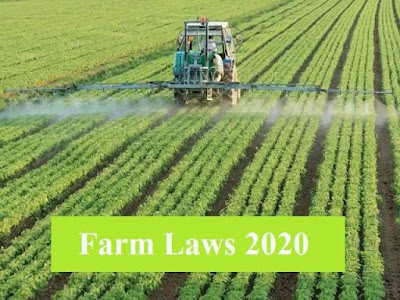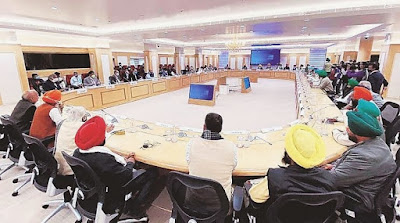The Indian agriculture laws/Farm Bills are initiated by parliament in September 17, 2020. Loksabha approved them in September 17, 2020 and Rajyasabha approved them in September 20,2020. And the President of India gave his consent on September 27, 2020. Here we have India 2020: New Agricultural Reforms Explained
NEW AGRICULTURAL REFORMS
- The Government of India has undertaken historical reforms in the areas of agricultural marketing and trade, and contract farming by bringing in two new laws, and modifying the Essential Commodities Act (1955) to attract investments in logistics and modern infrastructure.These reforms were debated for a long time and are considered essential to address the structural problems of the agriculture sector and transform it by seizing upcoming opportunities.
- NITI Aayog provided the background material and inputs for these reforms and formulation of new Acts. NITI Aayog played a significant role in creating awareness, through newspaper articles, webinars and TV debates, on the need for these reforms, their benefits to farmers and consumers, and the role they will play in transforming the agriculture sector and rural economy.
- NITI Aayog prepared working papers in English and Hindi to put into perspective the implications of the new farm laws.
- The working papers were shared with the Union Council of Ministers, all Chief Ministers and Members of Parliament, progressive farmers across the country and all Krishi Vigyan Kendras of the Indian Council of Agricultural Research (ICAR).
- It was demonstrated that the Farmers’ Produce Trade and Commerce (Promotion and Facilitation) Act 2020 will ensure better prices to farmers and a better deal for consumers by:
- Providing more options to farmers to sell their produce
- Facilitating direct sale by farmers without any intermediaries .
- Increasing competition among buyers.
- Promoting barrier-free inter- and intra-state trade and commerce
- Other expected benefits are market integration, higher export competitiveness, lower logistics costs and a push to processing activities.
- Annual Report 2020–21 9 Annual Report 2020–21 9 The Farmers’ (Empowerment and Protection) Agreement on Price Assurance and Farm Services Act 2020 covers two aspects: provision for guaranteed price, input and technical services to farmers by registered individual, firm, company, cooperative society, etc., under mutually acceptable agreements between farmers and sponsors prior to production.
- This Act intends to insulate interested farmers, especially small ones, against market and price risks so they can go for high-paying options, such as the cultivation of high-value crops, without worrying about the market and price fluctuations in the harvest season.
- If a farmer is interested, they can also get technical services and inputs from the sponsor. There is nothing in the Act beyond these two provisions.
- The Act does not require any farmer to go for this agreement; it is entirely left to them to enter into the agreement or not. The Act prohibits the farming agreement to include transfer, sale, lease, mortgage of the land or premises of the farmer.
- The modification in the Essential Commodities Act (ECA) specify transparent criteria in terms of price trigger for imposing ECA rather than leaving it to the arbitrary decisions of bureaucrats to revoke it.
- The power of the government to impose ECA remains intact. The modification in ECA sets a much higher limit for the rise in producer prices before the government can take action on stock limits, which is favourable to the farmers.
- The modification in ECA will attract much-needed private investments in agriculture. NITI Aayog publications have clearly stated that the three policy reforms undertaken by the Central Government through the three Acts are in keeping with the changing times and requirements of farmers and farming.
- If they are implemented in the right spirit, they will take Indian agriculture to new heights and usher in transformation of the rural economy. The reforms have generated optimism for India to become a global power in agriculture and a powerhouse of global food supply.
- The reforms carry the seeds for farmers’ prosperity and transformation of the rural economy.
Source: Niti Aayog
There has been many proposals and Objections between the Centre and Farmers.
Centre's Proposal:
State governments can impose fee/cess on the private mandis.
Farmer's Objection:
Creation of private mandis along with the state-run Agriculture Produce Market Committees (APMC) will push all agriculture businesses towards private markets. The result will be the end of government markets and intermediary (commission agent) systems as well as APMC systems.
Centre’s proposal:
Written assurance from government for the continuation of the existing MSP system
Farmers’ objection:
We are not only apprehensive but fully convinced that the new agricultural Acts are brought to dismantle APMCs. Therefore, we are demanding that the Union government should employ a comprehensive Act on MSP for the whole country and for all crops.
Centre’s proposal:
State governments can register traders to regulate them.
Farmers’ objection:
The present farm laws have no provision to regulate the traders. These Acts give permission to any PAN cardholder to procure grains from the markets at wishful prices and indulge in hoarding. Instead of making provisions of registration to regulate the traders, the Central is trying to pass the buck to state governments to regulate the traders.
Centre’s proposal:
Under the contract farming law, farmers will have the alternative to approach the court and their land will be safe as no loan will be given on farmers’ land and their buildings by mortgaging it.
Farmers’ objection:
Farm outfits are apprehensive about grabbing the farmers’ land by the large corporations under the contract farming. The Union government has put a proposal to allay the fears of farmers by saying that there will be no sale, lease, and transfer of land during the period of contract agreement. But the history of contract farming has many examples of non-payment by the companies making various excuses like substandard produce.
Centre’s proposal:
Power Bill 2020 is only a draft open for discussion
Farmers’ objection:
The Union government wants to control the power sector by taking it from the jurisdiction of states. It wants to discontinue the subsidies to farmers. The WTO has given repeated instructions to Indian government to discontinue the subsidies. Therefore the Modi government wants to bring the power sector under the central control. Check out more here.
Source: Indian express
Share our INDIA 2020: NEW AGRICULTURAL REFORMS with your friends.
Subscribe with your email! Don't forget to Comment down your Opinions.
Please Share Our Article with your friends, It means alot to us.
Team Galactic Sage :)
Write for us at kevinkooper01@gmail.com
Follow us on our social media ♥️
Support Us 😁












0 Comments